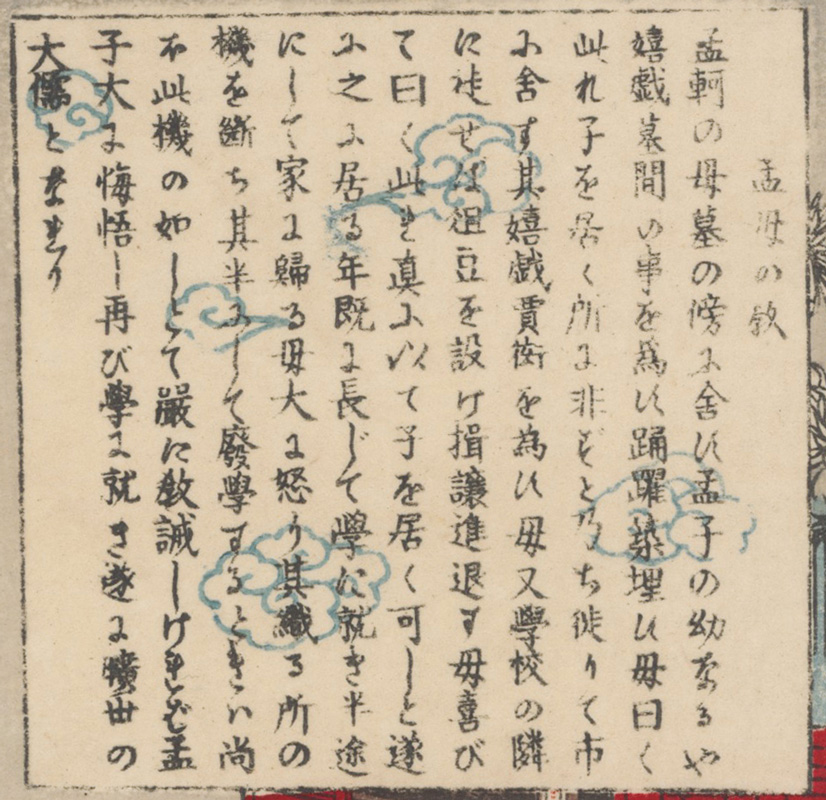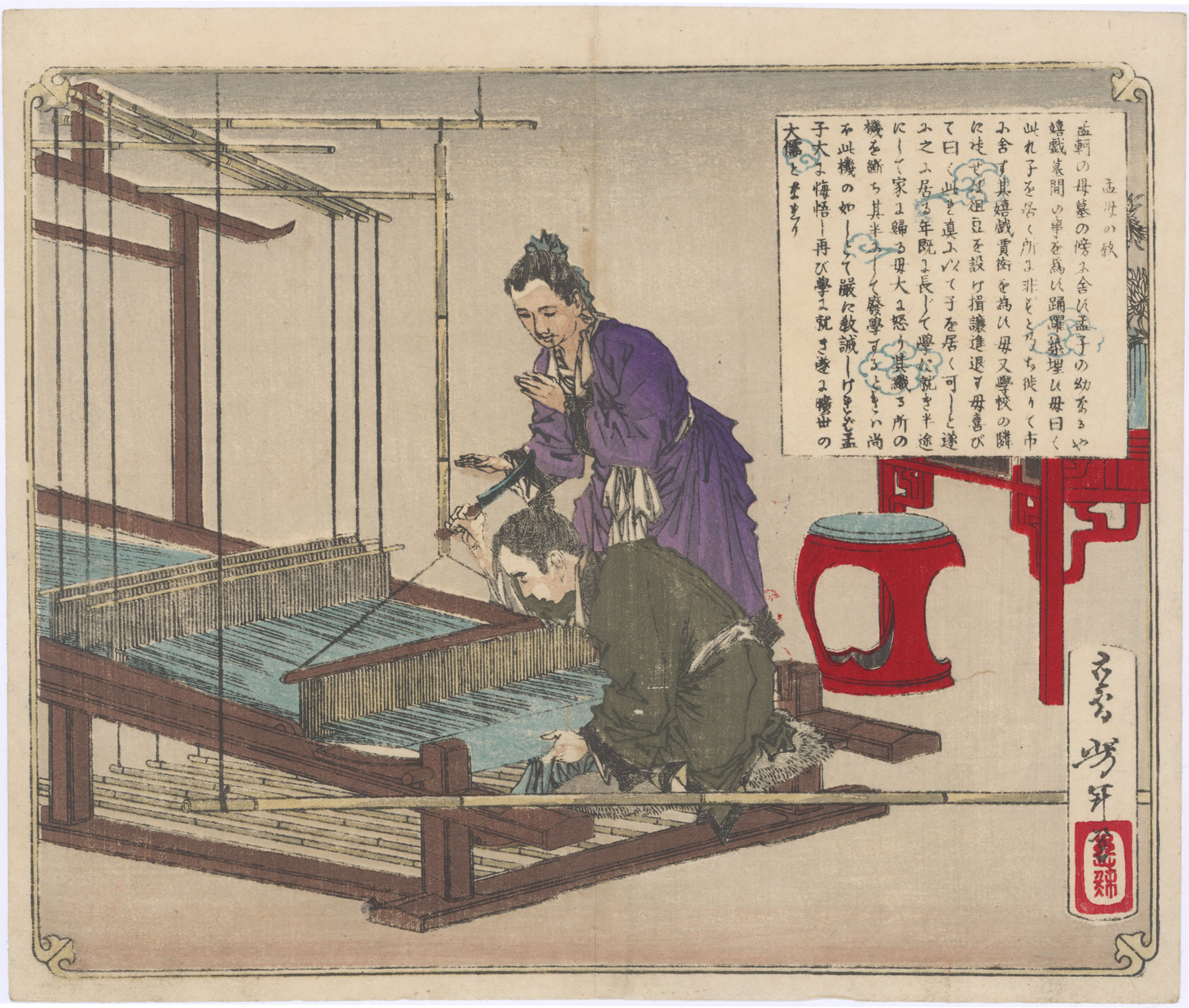About This Print
In this print, originally created for volume one of the six volume elementary school morals textbook Nishikie Shūshindan ("Brocade Pictures for Moral Education"), Yoshitoshi portrays Mencius (c. 371-289 BCE), one of the greatest Confucian philosophers of early China, and his mother at a weaving loom.
For more information about shūshindan (moral education) and the prints included in, or associated with, these textbooks see the article Brocade Pictures for Moral Education on this site.
A Lesson Drawn from WeavingSource: ""Menciusand his Mother: A Lesson Drawn from Weaving" [Literary Excerpt andIllustration]," in Children and Youth in History, Item #189,http://chnm.gmu.edu/cyh/items/show/189 (accessed January 20, 2019). Annotatedby Anne Kinney
The story is told as follows:
When Mencius was young, after finishing his studies he returned home. At that moment, Mencius' mother was weaving. She asked him, saying, "How far did you get in your studies today?" Mencius replied, "About the same as usual." Mencius' mother then took up her knife and cut the cloth she was weaving. Mencius became alarmed and asked her to explain her actions. She said, "Your neglecting your studies is like my cutting the cloth I wove. Now a gentleman studies in order to establish his reputation, he asks questions to broaden his knowledge. This is the means by which he obtains peace and happiness at home and avoids harm when he goes abroad. If now, you neglect your studies, you will be unable to avoid a life of menial service and will lack the means to distance yourself from trouble and strife. How is it different from weaving and spinning to make a living? If midway I give up and abandon my weaving, how would I be able to clothe my husband and child and go for long without grain to eat? If a woman who abandons her livelihood and a man who neglects cultivating his virtue do not become burglars or thieves, then they will end their days as slaves." Mencius was frightened by his mother's words. Day and night he studied tirelessly. He then studied with the great master Zisi until he became one of the leading scholars of his generation.
Explanatory Cartouche

The Illustrations and Prints in the Textbooks
Yoshitoshi designed twelve aiban-size color prints along with all thirty-three black and white illustrations for the six volumes of Brocade Prints for Moral Obligations, issued between March 1882 and July 1884. Between one and three of Yositoshi's color prints were inserted, each print being folded in half, in the front of each book.
Many of Yoshitoshi's black and white illustrations later became the basis of single-sheet oban-size color prints designed by a number of his students, as is explained in the notes to the print titled Tame/reject wildness/violence with the sincere spirit of a filial child (IHL Cat. #430) by the artist Kobayashi Toshimitsu (active 1876–1904), a student of Yoshitoshi's.
Most, if not all, of the twelve color prints Yoshitoshi designed for the textbooks were reprinted in 1888 and sold as individual sheets.
A Little About the PublisherSource: Principle, Practice, and the Politics of Educational Reform in Meiji Japan, Mark Elwood Lincicome, University of Hawaii Press, 1995, p. 81-82.
Tsuji Keiji, an alumnus of the Tokyo Normal School and the author of several textbooks, was intensely committed to the dissemination of developmental education. To that end, in 1882 he established his own publishing house, the Fukyūsha (fukyū means “disseminate”), which published numerous books incorporating the principles of developmental education.
Print Details
| IHL Catalog | #922 |
| Title | The Teachings of the Mother of Mencius 孟母の教 |
| Series | Nishikie Shūshindan 錦絵修身談 (Brocade Pictures for Moral Education; also seen translated as Instructive Stories in Color Prints and Color Prints of Stories for Moral Education) The print was created for Volume 1 (巻一) of the textbooks. |
| Artist | Tsukioka Yoshitoshi (1839-1892) |
| Signature |  |
| Seal | 大蘇 Taiso in seal script as shown above |
| Date | 1882 |
| Publisher | 普及舎 辻敬之 Tsuji Keiji of Fukyūsha |
| Carver | |
| Impression | good |
| Colors | excellent |
| Condition | good - center fold from insertion in book |
| Genre | kyōiku nishikie |
| Miscellaneous | Keyes 454-3 |
| Format | horizontal aiban folded in half for insertion into textbook |
| H x W Paper | 8 13/16 x 10 7/16 in. (22.4 x 26.5 cm) |
| H x W Image | 8 1/16 x 10 1/16 in. (20.5 x 25.6 cm) |
| Collections This Print | |
| Reference Literature | Yoshitoshi, Masterpieces from the Ed Freis Collection, Chris Uhlenbeck and Amy Reigle Newland, Hotei Publishing, 2011, p. 155, no. 27. |


